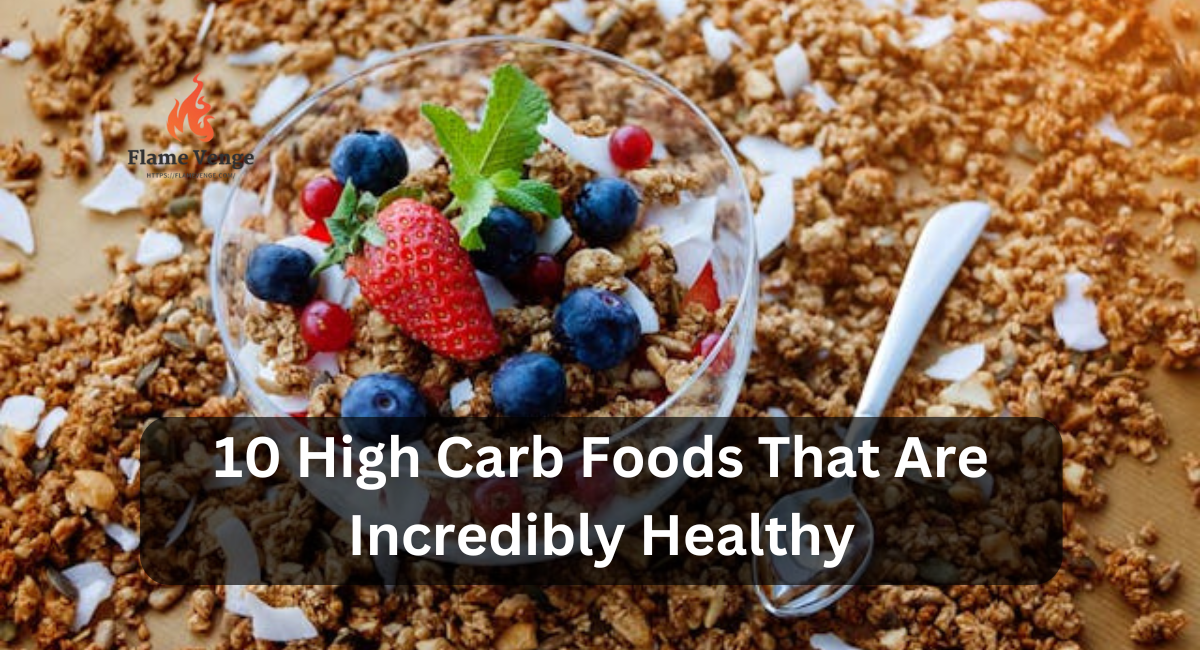People often think carbohydrates are bad, especially with the increase in popularity of diets that restrict carb intake. However, not all carbs are created equal. Whole, nutrient-dense carbohydrate-rich foods can be incredibly healthy and beneficial for overall well-being.
These high-carb foods provide essential nutrients, energy, and fiber, making them a valuable part of a balanced diet. Here are ten high-carb foods that are not only nutritious but also support various aspects of health.
1. Sweet Potatoes
Complex carbs can be found in abundance in sweet potatoes. They are plentiful in nutrients, minerals, and cell reinforcements, including beta-carotene, which is switched over completely to vitamin An in the body. Yams have a low glycemic record, meaning they give a consistent arrival of energy and assist with keeping up with stable glucose levels.
Benefits:
- High in fiber and vitamins A and C
- Contains antioxidants like beta-carotene
- Supports immune function and eye health
How to Use:
- Roast or bake for a nutritious side dish
- Add to soups and stews
- Use in casseroles or as a base for veggie bowls
2. Quinoa
Quinoa is a healthy whole grain that is high in protein, fiber, and important amino acids. It contains all essential amino acids and may assist in maintaining stable blood sugar levels
Benefits:
- High in protein and fiber
- Contains all essential amino acids
- Gluten-free and versatile
How to Use:
- Serve as a side dish or base for grain bowls
- Add to salads or soups
- Use in baking recipes or as a substitute for rice
3. Oats
Oats are a whole grain that provides complex carbohydrates, fiber, and essential nutrients. They are particularly rich in beta-glucan, a type of soluble fiber that has been shown to lower cholesterol levels and improve heart health. Oats also have a low glycemic index, making them ideal for sustained energy.
Benefits:
- High in fiber, particularly beta-glucan
- Supports heart health and digestion
- Provides sustained energy release
How to Use:
- Prepare as oatmeal for breakfast
- Add to smoothies or yogurt
- Use in baking recipes like cookies and granola bars
4. Brown Rice
Brown rice is a healthy whole grain because it keeps the outer layers, making it better for you than white rice. It is high in fiber, vitamins, and minerals. The natural sugars in brown rice give you consistent energy and help your digestion.
Benefits:
- High in fiber and essential nutrients
- Supports digestive health
- Provides sustained energy
How to Use:
- Serve as a side dish or base for stir-fries
- Add to soups or salads
- Use in grain bowls or as a substitute for white rice
5. Legumes
Beans and peas like lentils, chickpeas, and black beans have lots of healthy carbs, protein, and fiber. They have a low glycemic index and can help regulate blood sugar levels. Legumes also have lots of vitamins, minerals, and antioxidants.
Benefits:
- High in protein and fiber
- Low glycemic index
- Supports heart health and digestion
How to Use:
- Add to salads or soups
- Use in stews or casseroles
- Make into hummus or bean dips
6. Fruits
Fruits, such as apples, bananas, and berries, are rich in natural sugars, fiber, vitamins, and antioxidants. While they are high in carbohydrates, the fiber and natural sugars in fruits help regulate blood sugar levels and provide essential nutrients.
Benefits:
- High in vitamins, minerals, and antioxidants
- Provides fiber and natural sugars
- Supports overall health and digestion
How to Use:
- Enjoy fresh as a snack
- Add to yogurt or cereal
- Use in smoothies or baking recipes
7. Whole Wheat Bread
Whole grain wheat is used to make whole wheat bread, which retains the grain’s seed, inner part, and outer layer. It has a lot of vitamins, minerals, and fiber. Bread made from whole wheat contains complex carbohydrates that support healthy digestion and maintain stable blood sugar levels.
Benefits:
- High in fiber and essential nutrients
- Supports digestive health
- Provides sustained energy
How to Use:
- Use for sandwiches or toast
- Add to breakfast with avocado or nut butter
- Incorporate into meals as a side or base for toppings
8. Barley
Barley is a healthy grain with lots of fiber, vitamins, and minerals. It contains beta-glucan, a type of fiber that can lower cholesterol and maintain heart health. Barley has a low glycemic index, making it a good choice for maintaining stable blood sugar levels.
Benefits:
- High in fiber and beta-glucan
- Supports heart health and digestion
- Provides sustained energy
How to Use:
- Add to soups or stews
- Use as a base for grain bowls
- Serve as a side dish or in salads
9. Beets
Beets are a type of vegetable that give us energy, help with digestion, and have lots of important vitamins and minerals. They are rich in antioxidants like betalains, which have anti-inflammatory and detoxifying properties. Beets also help support cardiovascular health.
Benefits:
- High in fiber and antioxidants
- Supports heart health and detoxification
- Provides essential vitamins and minerals
How to Use:
- Roast or steam and add to salads
- Use in smoothies or soups
- Pickle or add to grain bowls
10. Corn
Corn is a healthy food that gives you energy and helps your body work well. It is high in antioxidants like lutein and zeaxanthin, which support eye health. Corn has a moderate glycemic index and provides sustained energy.
Benefits:
- High in fiber and antioxidants
- Supports eye health and digestion
- Provides sustained energy
How to Use:
- Enjoy fresh or frozen as a side dish
- Add to soups or salads
- Use in baking recipes or as a base for dishes
Conclusion
High-carb foods can be incredibly healthy when chosen wisely. Foods like sweet potatoes, quinoa, oats, and legumes give your body good energy and help keep you healthy. Incorporating these nutrient-dense options into your diet can help you maintain stable blood sugar levels, support digestion, and promote heart health.
By focusing on whole, unprocessed carbohydrate sources, you can enjoy the benefits of carbs while contributing to a balanced and nutritious diet.
READ ALSO:

